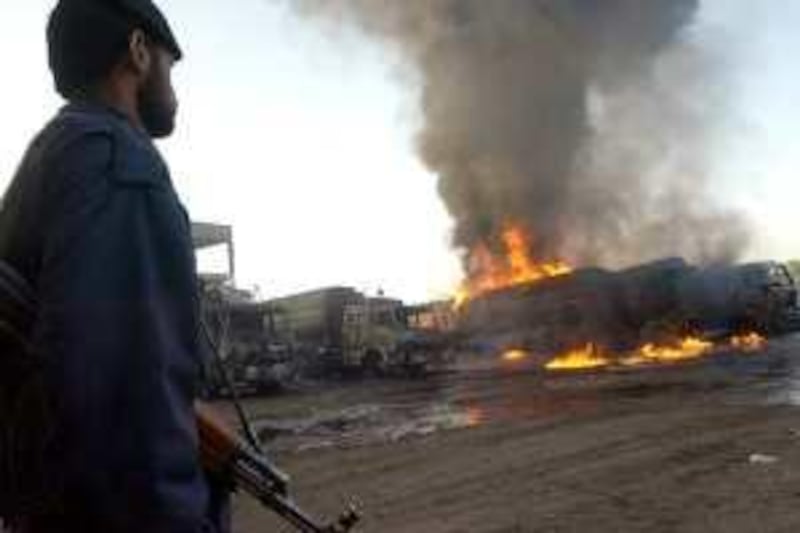ISLAMABAD // Twenty years ago, veteran Pakistani columnist Nusrat Javeed was known for his colourful descriptions of the politics of connivance in Islamabad. Many wondered what was meant by his repeated Shakespearean reference to "this kingdom of Denmark". Naively, they assumed his fondness for describing the capital "as an island five kilometres from Pakistan" was a backhanded compliment to the city's superior infrastructure.
Two decades later, Mr Javeed's cryptic language about Pakistan's short-sighted politics still applies. The black and white vocabulary used by the state, and a fawning "independent" media, to differentiate between the "good" and the "bad" in the conflict currently raging in the north-west erases the blurry lines between the two. The "good", of course, are the thousands of security forces personnel putting their lives on the line against the "bad" enemies of the state, notably Maulana Fazlullah of Swat, Mauvli Faqeer Mohammed of Bajaur tribal agency, Commander Tariq Afridi of Khyber tribal agency and, of course, Baitullah Mehsud, the South Waziristan-based daddy of the lot.
However, there is a third group of players, men who draw inspiration from Mr Javeed's kingdom of Denmark, who are being lumped with the "good". Much has been made in the media, international as well as domestic, of the emergence of militants opposed to the enemies of the state, particularly Zain-ud-Din Mehsud and Turkestan Bhitani. The two were reinvented for the media. Both staked their claim to divine backing by adopting the religious title of "qari" - somebody qualified to teach the Quran. They also described themselves as former mujahideen, holy warriors fighting infidel occupiers of neighbouring Afghanistan.
The media obligingly spread the word, unwittingly (or on official advice) helping establish the pair's credentials as the "good", particularly after Zain-ud-Din Mehsud was murdered last week by one of his bodyguards. Viewers and readers swallowed the cheering news with relish, failing, perhaps, to read the subtitles. Zain-ud-Din Mehsud, for instance, had alleged that Baitullah was responsible for the "martyrdom" in 2006 of Abdullah Mehsud, his predecessor as the dominant militant commander in South Waziristan.
A glance back at history, however, reminds us that security forces killed Abdullah just days after he had signed a peace agreement with the military. That might make Baitullah a rat, but it hardly paints Zain-ud-Din as a good guy. As for Turkestan Bhitani, I have asked a dozen knowledgeable people living in his area (Jandola and Dera Ismail Khan) about his claim of being a fearless former Afghan mujahideen fighter during the Soviet jihad.
The uniform response was: "He is just a regular guy" who rose - apparently with encouragement from local army commanders - against Baitullah once the latter began targeting the Bhitani tribe. It becomes clear that the pair had personal reasons for opposing Baitullah. Tribal elders and residents say he travels with an official security detail, otherwise reserved for officers of the rank of colonel and above, which strongly suggest they are little more than pawns of the state.
Militant commanders aligned with Haji Nazeer Ahmedzai, a commander who has largely stayed out of the fray in South Waziristan, recently confessed to being highly amused at the antics of Mr Bhitani and the late Zain-ud-Din Mehsud. The former, they claimed, had taken a delivery of arms from the army that was supposed to be distributed to fighters of both anti-Baitullah allies, but he refused to share them with Zain-ud-Din.
But far more entertaining was their claim - which other militant sources mirthfully verified - that the two had travelled in a stolen Afghan police Jeep to Khyber Agency to meet Haji Mangal Bagh Afridi to invite him to join their alliance, leaving the vehicle behind as a sweetener. Mr Afridi, who heads the Lashkar-i-Islam militant faction, has since obligingly issued a new manifesto, distributed to a group of journalists from Peshawar, which paints him as the latest of the "politically correct" Taliban loyal to the state.
In it, the organisation, which has an ugly track record of blowing up Sufi shrines, Nato containers and movie stores, has imposed a "complete ban on domestic and foreign terrorists in Khyber Agency" and vowed to "justly co-operate" with security forces performing their duties there. Lashkar-i-Islam further vowed to provide all possible protection, within Khyber Agency, to the ideological and territorial integrity of Pakistan.
The clincher, though, has to be its call for "women to be adorned with the jewellery of education, albeit in purdah [under cover]", promise to provide a conducive environment for students, teachers and doctors of both genders, and the threat of imposing a 10,000 rupee (Dh186) fine on men who send their women outside the house to perform menial tasks like collecting firewood. Apart from those clauses, however, the manifesto reads, almost to the word, like proclamations issued by "bad" guys such as Sufi Mohammed of Swat (now in protective custody in Peshawar, according to security sources), seeking to impose a harsh code of conduct that supersedes the writ of the state.
It is a reminder that militant commanders have a habit of rising with state support and being felled by state ammunition when they exceed their use value. thussain@thenational.ae





